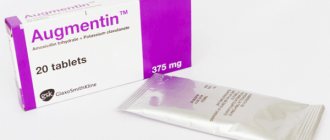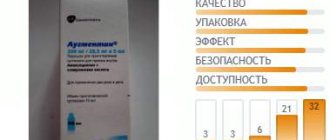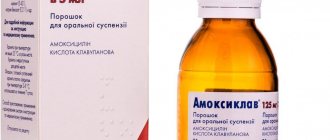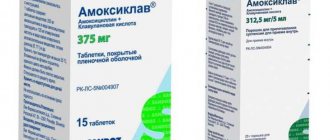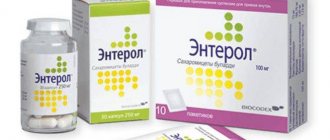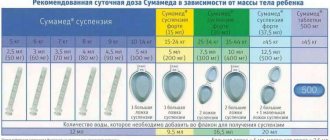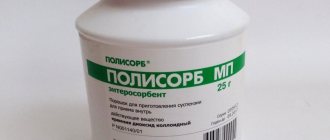Compound
One tablet p/o for oral administration contains 0.25, 0.5 or 0.875 g of amoxicillin trihydrate and 0.125 g of clavulanic acid (during the production of the drug, sodium clavulanate is added with a 5% excess).
Auxiliary components included in the tablets : Silicii dioxydum colloidale, Magnesium stearate, Carboxymethylamylum natricum, Cellulosum microcrystallicum.
One bottle of powder for preparing a solution for injection contains 0.5 or 1 g of amoxicillin trihydrate and, respectively, 0.1 or 0.2 g of clavulanic acid .
The composition of Augmentin powder for the preparation of a suspension for oral administration includes 0.125/0.2/0.4 g (5 ml) amoxicillin trihydrate and, accordingly, 0.03125/0.0285/0.057 g (5 ml) clavulanic acid .
Auxiliary components : Xanthan gum, Hydroxypropyl methylcellulose, Silicii dioxydum colloidale, Acidum succinicum, Silicii dioxydum, Aspartamum (E951), dry flavors - orange (610271E and 9/027108), raspberry and “Light molasses”.
powder , intended for the preparation of 100 ml of suspension , contains 0.6 g (5 ml) amoxicillin trihydrate and 0.0429 g (5 ml) clavulanic acid .
Auxiliary components : Silicii dioxydum colloidale, Carboxymethylamylum natricum), Aspartamum (E951), Xanthan gum, Silicii dioxydum, strawberry flavor 544428.
One Augmentin SR tablet with prolonged action contains 1 g of amoxicillin trihydrate and 0.0625 g of clavulanic acid .
Auxiliary components : Cellulosum microcrystallicum, Carboxymethylamylum natricum, Silicii dioxydum colloidale, Magnesium stearate, Xanthan gum, Аcidum citrinosum, Hypromellosum 6cps, Hypromellosum 15cps, Titanium dioxide (E171), Macrogolum 3350, Macrogolum 8000.
Release form
The drug has the following forms of release:
- Tablets Augmentin 250 mg + 125 mg, Augmentin 500 mg + 125 mg and Augmentin 875 + 125 mg.
- Powder 500/100 mg and 1000/200 mg, intended for the preparation of solution for injection.
- Powder for the preparation of Augmentin suspension 400 mg/57 mg, 200 mg/28.5 mg, 125 mg/31.25 mg.
- Augmentin EC powder 600 mg/42.9 mg (5 ml) for suspension preparation.
- Augmentin SR 1000 mg/62.5 mg coated po tablets with prolonged release.
Prohibitions on use
Since the suspension can be prescribed to babies almost from birth, the list of contraindications for the medication is minimal. Instructions for use of the Augmentin 400 suspension indicate a strict prohibition for children with hypersensitivity to any of the components of the composition, to penicillin antibiotics and cephalosporins. Also, patients with phenylketonuria should not take the drug, since the suspension contains aspartame.
Caution should be exercised in treating children with impaired liver and kidney function. Children with similar diagnoses should be treated with the drug exclusively under the constant supervision of specialists in a hospital.
In infectious mononucleosis, a severe rash on the body, similar to bark rashes, is provoked by taking the Augmentin 400 suspension for children. The dosage can be any.
Taking the medication is also contraindicated in the first trimester of pregnancy. Further, if there is an urgent need for antibiotic therapy, Augmentin can be used, but in rare cases. At the moment, the effect of the drug on the baby’s body has not yet been fully studied, but it is already known that the active substance can penetrate through the mother’s placenta.
Pharmacodynamics and pharmacokinetics
According to Wikipedia, Amoxicillin is a bactericidal agent that is effective against a wide range of pathogenic and potentially pathogenic microorganisms and is a semi-synthetic antibiotic of the penicillin group .
By suppressing transpeptidase and disrupting the production of murein (an essential component of bacterial cell walls) during division and growth, it thereby provokes lysis (destruction) of bacteria .
Amoxicillin is destroyed by β-lactamases , so its antibacterial activity does not apply to microorganisms that produce β-lactamases .
Acting as a competitive and in most cases irreversible inhibitor, clavulanic acid bacterial cell walls and cause inactivation of enzymes that are located both inside the cell and at its border.
Clavulanate forms stable inactivated complexes with β-lactamases , and this in turn prevents the destruction of amoxicillin .
The antibiotic Augmentin is effective against:
- Gram (+) aerobes: pyogenic streptococci of groups A and B, pneumococci , Staphylococcus aureus and Staphylococcus epidermidis (with the exception of methicillin-resistant strains), saprophytic staphylococcus , etc.
- Gram (-) aerobes: Pfeiffer bacillus , pertussis bacillus , Gardnerella vaginalis , Vibrio cholerae , etc.
- Gram (+) and Gram (-) anaerobes: bacteroides , fusobacteria , prevotella , etc.
- Other microorganisms: chlamydia , spirochetes , treponema pallidum , etc.
After taking Augmentin orally, both active components included in its composition are quickly and completely absorbed from the digestive tract. Absorption is optimal if the tablets or syrup are taken during meals (at the beginning of the meal).
Both when taken orally and when Augmentin solution is administered intravenously, therapeutic concentrations of the active components of the drug are found in all tissues and interstitial fluid.
Both active components bind weakly to plasma proteins (up to 25% of amoxicillin trihydrate and no more than 18% of clavulanic acid ). Augmentin accumulation was not detected in any of the internal organs.
Amoxicillin is extensively metabolized in the body and is excreted by the kidneys , through the digestive tract and as carbon dioxide in exhaled air. From 10 to 25% of the received dose of amoxicillin is excreted by the kidneys in the form of penicillic acid , which is its inactive metabolite .
Clavulanate is excreted both by the kidneys and through extrarenal mechanisms.
What is more effective: Augmentin or Suprax?
The therapeutic effect of Suprax is explained by cefixime. The medicine belongs to the 3rd generation cephalosporins. In the pharmacy, Suprax is also available in the form of a suspension, which is prohibited for children under six months old if they are allergic to the composition of the medication, penicillin and cephalosporin antibiotics.
Antimicrobial agents differ in their spectrum of antibacterial activity, so the doctor must decide which drug is better.
Indications for use
Indications for the use of a combination of amoxicillin trihydrate and clavulanic acid are infections caused by microorganisms .
Treatment with Augmentin is also allowed for infections caused by the activity of microorganisms sensitive to the action of amoxicillin , as well as mixed infections caused by bacteria sensitive to amoxicillin and bacteria that produce β-lactamase and are characterized by sensitivity to the combination of active substances of the drug.
On the Internet there are often questions “What are Augmentin tablets for? ” or “What does Augmentin syrup treat?”.
The scope of the drug is quite extensive. It is prescribed for the following infectious and inflammatory diseases :
- for infections affecting the upper and lower respiratory tract (including ENT infections );
- for infections affecting the genitourinary tract ;
- for odontogenic (affecting the oral cavity) infections ;
- for gynecological infections ;
- for gonorrhea ;
- for infections affecting the skin and soft tissues ;
- for infections affecting bone tissue (including if it is necessary to prescribe long-term therapy to the patient);
- for other infections of a mixed type (for example, after a septic abortion , for sepsis in the postpartum period, for septicemia (sepsis without metastases), peritonitis ; for sepsis caused by intra-abdominal infection ; for infections developing after surgery ).
Augmentin is often used for preventive purposes before major surgical operations on the head, neck, gastrointestinal tract, kidneys, biliary tract, on organs located in the pelvic cavity , as well as during the procedure of implantation of internal organs .
Additional recommendations
Before starting the use of Augmentin, it is necessary to collect the patient's medical history in order to identify possible hypersensitivity reactions to penicillin, cephalosporin and other components.
Taking Augmentin suspension may stain the patient's teeth. To avoid the development of such an effect, it is enough to follow the basic rules of oral hygiene - brushing your teeth, using mouthwash.
Taking Augmentin can cause dizziness, so during therapy you should refrain from driving vehicles and performing work that requires increased concentration.
Augmentin cannot be used if an infectious form of mononucleosis is suspected.
Augmentin is well tolerated and has low toxicity. If long-term use of the medicine is required, then it is necessary to periodically check the functioning of the kidneys and liver.
Contraindications
Augmentin in all dosage forms is contraindicated:
- patients with hypersensitivity to one or both active components of the drug, to any of its excipients, as well as to β-lactams (that is, to antibiotics from the penicillin and cephalosporin );
- patients whose Augmentin therapy was preceded by episodes of jaundice or who had a history of functional liver due to the use of a combination of active substances of the drug.
An additional contraindication to the use of powder for the preparation of an oral suspension with a dosage of active substances of 125 + 31.25 mg is PKU ( phenylketonuria ).
The powder used for the preparation of oral suspension with a dosage of active substances (200 + 28.5) and (400 + 57) mg is contraindicated:
- with PKU ;
- patients with impaired renal , in which the Rehberg test is below 30 ml per minute;
- children under three months of age.
An additional contraindication to the use of tablets with a dosage of active substances (250 + 125) and (500 + 125) mg is age under 12 years and/or weight less than 40 kilograms.
Tablets with a dosage of active substances 875 + 125 mg are contraindicated:
- if the functional activity of the kidneys ( Rehberg test are below 30 ml per minute);
- children under 12 years of age;
- patients whose body weight does not exceed 40 kg.
Which is preferable: Sumamed or Augmentin?
The therapeutic effect of Sumamed is explained by azithromycin. The antibiotic stops the growth and reproduction of streptococci, staphylococci, gonococci, Haemophilus influenzae, chlamydia, and mycoplasma. Sumamed in suspension can be administered to patients over 6 months of age. It is contraindicated in case of allergies to its composition, fructose intolerance, severe liver and kidney diseases. It is not recommended in case of hypersensitivity to other macrolides and ketolides, glucose and galactose malabsorption, sucrase-isomaltase deficiency. Sumamed should not be combined with ergotamine and dihydroergotamine.
This antibiotic should be taken once a day for the entire 72 hours, but this does not mean that it is preferable since it has a different spectrum of antimicrobial activity and can provoke severe adverse reactions.
Side effects
Side effects of Augmentin can occur in various systems and individual organs. The most common reactions that occur during treatment with the drug are:
- candidiasis (thrush) of the skin and mucous membranes;
- diarrhea (very often when taking Augmentin in tablets, often when taking a suspension or administering the drug in injection form);
- attacks of nausea and vomiting (nausea most often occurs when taking the drug in high doses).
Infrequently occurring side effects include:
- dizziness;
- headache;
- digestive dysfunction ;
- moderately pronounced increase in the activity of the liver enzymes alanine transaminase (ALT) and aspartate transaminase (AST) ;
- skin rashes , skin itching , manifestations of urticaria .
In rare cases, the body may react to taking Augmentin:
- development of reversible leukopenia (including agranulocytosis ); thrombocytopenia ;
- development of thrombophlebitis at the injection site;
- multimorphic erythema.
Very rarely the following may develop:
- hemolytic anemia;
- conditions characterized by an increase in the duration of bleeding and an increase in the prothrombin index ;
- reactions from the immune system , which are expressed in the form of angioedema ; a syndrome similar to that seen in serum sickness ; anaphylaxis , allergic vasculitis ;
- reversible hyperactivity
- increased convulsive activity ;
- colitis caused by taking antibiotics , including pseudomembranous (PMC) and hemorrhagic (the likelihood of developing the latter is reduced if Augmentin is administered parenterally);
- keratinization and proliferation of filiform papillae located on the tongue (a disease known as “black “hairy” tongue”);
- hepatitis and intrahepatic cholestasis ;
- Lyell's syndrome;
- generalized exanthematous pustulosis in acute form;
- interstitial nephritis;
- the appearance of salt crystals in the urine ( crystalluria ).
If any dermatitis of an allergic nature occurs, treatment with Augmentin should be discontinued.
Admission rules
When giving medication to a child, parents need to remember:
- The antibiotic should not be taken for less than 5 days.
- A child should not take the medication for more than 2 weeks without reviewing the clinical case.
- Before giving the drug to a child under 2 years of age, the suspension can be diluted 1:1 with water.
- To ensure that the medication does not lose its bactericidal effect, it must be kept at a temperature of up to 25 degrees for 24 months. After dissolution, it should be stored at a temperature of 2 to 8 degrees. The suspension is good for only a week.
- Probenecid may increase the level of amoxicillin in the blood, so it is not recommended to take it during treatment with Augmentin.
- When prescribed simultaneously with antibiotic therapy, allopurinol increases the risk of allergic skin reactions.
- Augmentin may increase the harmful effects of methotrexate.
- The antibiotic may reduce the absorption of estrogens, which may reduce the effectiveness of hormonal birth control pills.
- During antibiotic therapy, dosage adjustment of oral coagulants may be necessary.
- If anaphylaxis occurs due to taking the suspension, the child should be given epinephrine as soon as possible. If necessary, the doctor may prescribe oxygen therapy and the injection of glucocorticoids into a vein. Airway management may be necessary.
- During long-term antibiotic therapy, it is necessary to periodically check the condition of the liver and kidneys and blood tests.
- If, due to taking the medication, severe diarrhea with abdominal cramps begins, this may be a sign of pseudomembranous colitis. Therefore, if these symptoms appear, you need to interrupt treatment and consult a doctor.
- While taking an antibiotic, you should drink enough fluids to prevent crystalluria.
- To prevent discoloration of tooth enamel, it is important to brush your teeth thoroughly during therapy.
- Due to taking an antibiotic, there may be false positive results when performing a Coombs test and determining the level of glucose in urine.
Instructions for use of Augmentin: method of application, dosage for adult patients and children
One of the most frequently asked questions from a patient is how to take this or that medicine - before or after meals. In the case of Augmentin, taking the drug is closely related to food intake. It is considered optimal to take the medicine immediately before meals .
Firstly, this ensures better absorption of active substances from the gastrointestinal tract , and, secondly, it can significantly reduce the severity of dyspeptic disorders in the gastrointestinal tract , if the latter occur.
How to calculate the dose of Augmentin
How to take Augmentin for adults and children, as well as its therapeutic dose, is determined depending on what microorganism is the causative agent, how sensitive it is to the effects of the antibiotic , the severity and characteristics of the disease, the location of the infectious focus , the age and weight of the patient, as well as how healthy the patient's kidneys .
The duration of the course of therapy depends on how the patient's body responds to treatment.
Augmentin tablets: instructions for use
Depending on the content of active substances in them, Augmentin tablets are recommended for adult patients to take according to the following regimen:
- Augmentin 375 mg (250 mg + 125 mg) - one three times a day. At this dosage, the drug is indicated for infections that occur in a mild or moderately severe form. For severe diseases, including chronic and recurrent ones, higher doses are prescribed.
- Tablets 625 mg (500 mg + 125 mg) - one three times a day.
- Tablets 1000 mg (875 mg + 125 mg) - one twice a day.
renal function .
Extended release tablets Augmentin SR 1000 mg/62.5 mg are approved only for patients over 16 years of age. The optimal dose is two tablets twice a day.
If the patient cannot swallow a whole tablet, it is divided in two along the break line. Both halves are taken at the same time.
For patients with kidney disease , the drug is prescribed only in cases where the Rehberg test exceeds 30 ml per minute (that is, when no adjustments are required to the dosage regimen).
Powder for solution for injection: instructions for use
According to the instructions, the solution is injected into a vein: by stream (the entire dose must be administered in 3-4 minutes) or by drip (infusion duration is from half an hour to 40 minutes). The solution is not intended for injection into the muscle.
The standard dose for an adult patient is 1000 mg/200 mg. It is recommended to administer it every eight hours, and for complicated infections - every six or even four hours (according to indications).
An antibiotic in the form of a solution of 500 mg/100 mg or 1000 mg/200 mg is prescribed to prevent the development of an infectious process after surgery . In cases where the duration of the operation is less than one hour, it is sufficient to administer a single dose of Augmentin 1000 mg/200 mg to the patient before anesthesia .
If the operation is expected to last more than an hour, the patient is given up to four doses of 1000 mg/200 mg in the 24 hours preceding it.
Augmentin suspension: instructions for use
Instructions for use of Augmentin for children recommend the administration of a suspension of 125 mg/31.25 mg at a dose of 2.5 to 20 ml. The frequency of receptions is 3 during the day. The volume of a single dose depends on the age and weight of the child.
If the child is over two months of age, a suspension of 200 mg/28.5 mg is prescribed in a dose equal to 25/3.6 mg to 45/6.4 mg per 1 kg of body weight. The indicated dose should be divided into two doses.
A suspension with a dosage of active substances of 400 mg/57 mg (Augmentin 2) is indicated for use starting from one year. Depending on the age and weight of the child, a single dose varies from 5 to 10 ml. The frequency of receptions is 2 per day.
Augmentin EC is prescribed starting from 3 months of age. The optimal dose is 90/6.4 mg per 1 kg of body weight per day (the dose should be divided into 2 doses, maintaining a 12-hour interval between them).
Today, the drug in various dosage forms is one of the most frequently prescribed drugs for the treatment of sore throat .
sore throat , Augmentin is prescribed in a dose that is determined based on the child’s body weight and age. For angina in adults, it is recommended to use Augmentin 875 + 125 mg three times a day.
Also, Augmentin is often prescribed for sinusitis . Treatment is supplemented by rinsing the nose with sea salt and using nasal sprays such as Rinofluimucil . Optimal dosage for sinusitis : 875/125 mg 2 times a day. The course duration is usually 7 days.
Overdose
Exceeding the dose of Augmentin is accompanied by:
- development of disorders of the digestive tract ;
- violation of water-salt balance;
- crystalluria;
- renal failure;
- precipitation (deposition) of amoxicillin in the urinary catheter.
When such symptoms appear, the patient is indicated for symptomatic therapy, which also includes correction of the disturbed water-salt balance. The removal of Augmentin from the bloodstream system is also facilitated by hemodialysis .
Interaction
Simultaneous administration of the drug with probenecid :
- helps reduce tubular secretion of amoxicillin ;
- provokes an increase in the concentration of amoxicillin in the blood plasma (the effect persists for a long time);
- does not affect the properties and levels of clavulanic acid in the blood plasma .
The combination of amoxicillin with allopurinol increases the likelihood of developing allergies . data on the interaction of allopurinol simultaneously with the two active components of Augmentan.
Augmentin affects the microflora contained in the intestinal tract , which provokes a decrease in reabsorption (reverse absorption) of estrogens , as well as a decrease in the effectiveness of combined oral contraceptives .
The drug is incompatible with blood products and protein-containing liquids, including whey protein hydrolysates and fat emulsions intended for intravenous administration.
If Augmentin is prescribed simultaneously with antibiotics aminoglycoside class , the drugs are not mixed in the same syringe or any other container before administration, as this leads to inactivation of the aminoglycosides .
Augmentin's analogues
Level 4 ATX code matches:
Arlet
Ecoclave
Panclave
Amoxiclav
Oxamp-Sodium
Oxamp
Amoxicillin + Clavulanic acid
Ampisid
Amoxil K 625
Flemoklav Solutab
Sultasin
Analogues of Augmentin are the drugs A-Klav-Pharmex , Amoxiclav , Amoxil-K , Betaclave, Clavamitin , Medoclav , Theraclave .
Each of the above drugs is something that can replace Augmentin in its absence.
The price of analogues varies from 63.65 to 333.97 UAH.
Augmentin for children
Augmentin is widely used in pediatric practice. Due to the fact that it has a children's release form - syrup, it can even be used to treat children under one year old. The fact that the medicine has a pleasant taste also makes it much easier to take.
For children, antibiotics are most often prescribed for sore throat . The dosage of the suspension for children is determined depending on age and weight. The optimal dose is considered to be a dose equal to 45 mg/kg per day, divided into two doses, or a dose equal to 40 mg/kg per day, divided into three doses.
How children take the drug and the frequency of doses depends on the prescribed dosage form.
For children whose body weight is more than 40 kg, Augmentin is prescribed in the same doses as for adult patients.
Augmentin syrup for children under one year of age is used in dosages of 125 mg/31.25 mg and 200 mg/28.5 mg. A dosage of 400 mg/57 mg is indicated for children over one year of age.
Children in the age category of 6-12 years (weighing more than 19 kg) can be prescribed both suspension and Augmentin tablets. The dosage regimen for the tablet form of the drug is as follows:
- one tablet 250 mg + 125 mg three times a day;
- one tablet 500 + 125 mg twice a day (this dosage form is optimal).
Children over 12 years of age are prescribed to take one tablet 875 mg + 125 mg twice a day.
In order to correctly measure the dose of Augmentin suspension for children under 3 months of age, it is recommended to draw the syrup with a syringe with a marking scale. To facilitate the use of the suspension in children under two years of age, it is allowed to dilute the syrup with water in a ratio of 50/50
Analogues of Augmentin, which are its pharmacological substitutes, are the drugs Amoxiclav , Flemoklav Solutab , Arlet , Rapiclav , Ecoclave .
Rules for preparing the suspension
The suspension is prepared immediately before the first use.
Add approximately 60 ml of boiled water, cooled to room temperature, to the bottle with the powder, then close the bottle with a lid and shake until the powder is completely diluted, let the bottle stand for 5 minutes to ensure complete dilution. Then add water up to the mark on the bottle and shake the bottle again. In total, about 92 ml of water is required to prepare the suspension.
The bottle should be shaken well before each use. For accurate dosing of the drug, you should use a measuring cap, which must be rinsed well with water after each use. After dilution, the suspension should be stored for no more than 7 days in the refrigerator, but not frozen.
For children under 2 years of age, a measured single dose of Augmentin suspension can be diluted by half with water.
Alcohol compatibility
Augmentin and alcohol are theoretically not antagonists; under the influence of ethyl alcohol, the antibiotic does not change its pharmacological properties.
If during treatment with the drug there is a need to drink alcohol, it is important to observe two conditions: moderation and expediency.
For people suffering from alcohol dependence, simultaneous use of the drug with alcohol can have more serious consequences.
Systematic alcohol abuse provokes various disorders in the liver . For patients with a diseased liver, the instructions recommend prescribing Augmentin with extreme caution, since it is extremely difficult to predict how the diseased organ will behave in attempts to cope with the xenobiotic .
Therefore, in order to avoid unnecessary risks, it is recommended to abstain from drinking alcohol during the entire period of treatment with the drug.
What should I buy my child Klacid or Augmentin?
Klacid contains clarithromycin as the main ingredient. This is a macrolide antibiotic. The drug is sold in suspension. It is contraindicated in case of allergies to its composition and other macrolides, porphyrin disease, increased potassium levels in the body, and simultaneous liver and kidney dysfunction. Klacid should not be given to a child if he has had hepatitis or cholestatic jaundice caused by clarithromycin in the past. It is contraindicated in cases of prolongation of the QT interval, heart rhythm disturbances, problems with the adsorption of galactose, fruit sugar and glucose, and sucrose-isomaltose deficiency.
Klacid and Augmentin have different spectrums of action, contraindications and side effects, so it is impossible to clearly choose the best medication.
Augmentin during pregnancy and lactation
Like most antibiotics of the penicillin group , amoxicillin , distributed in the tissues of the body, also penetrates into breast milk. of clavulanic acid may even be found in milk .
However, no clinically significant negative effect on the child’s condition is observed. In some cases, the combination of clavulanic acid with amoxicillin can cause diarrhea and/or candidiasis (thrush) of the mucous membranes in the oral cavity in .
Augmentin belongs to the category of drugs approved for breastfeeding. If, however, during the mother's treatment with Augmentin, the child develops certain undesirable side effects, stop breastfeeding.
Animal studies have shown that the active substances of Augmentin are able to penetrate the blood-placental (BPB) barrier . However, no negative effects on fetal development were identified.
Moreover, there were no teratogenic effects with both parenteral and oral administration of the drug.
The use of Augmentin in pregnant women can potentially lead to the development of necrotizing enterocolitis (NEC) in the newborn infant.
Like all other medicines, Augmentin is not recommended for pregnant women. During pregnancy, its use is permissible only in cases where, according to the doctor's assessment, the benefits to the woman outweigh the potential risks to her child.
Which medication should I give Augmentin or Flemoxin Solutab?
The bactericidal effect of Flemoxin Solutab is associated with amoxicillin. The medication is sold in the form of soluble tablets. They can be taken in a suitable dose from the first days of life. Compared to Augmentin, Flemoxin Solutab has a narrower spectrum of antibacterial activity. But soluble tablets have fewer restrictions on the start of therapy. Flemoxin Solutab is prohibited only if you are allergic to its active and inactive components, or if you are intolerant to other β-lactam antimicrobial agents.
It is up to the doctor to decide which of these medications is better, since they sometimes cause negative effects.
Reviews about Augmentin
Reviews of Augmentin tablets and suspensions for children are mostly positive . Many people rate the drug as an effective and trustworthy remedy.
On forums where people share their impressions of certain drugs, the average antibiotic rating is 4.3-4.5 out of 5 points.
Reviews about Augmentin left by mothers of small children indicate that the product helps to quickly cope with such common childhood illnesses as bronchitis or tonsillitis . In addition to the effectiveness of the drug, mothers also note its pleasant taste, which children like.
The product is also effective during pregnancy. Despite the fact that the instructions do not recommend treating pregnant women with the drug (especially in the 1st trimester), Augmentin is often prescribed in the 2nd and 3rd trimesters.
According to doctors, the main thing when treating with this drug is to maintain the accuracy of the dosage and follow all the recommendations of your doctor.
Description
In fact, Augmentin 400 suspension for children is a white powder packaged in a glass bottle and a cardboard box. You must prepare the medicine directly from it yourself by diluting it with ordinary boiled water. The characteristic smell of the powder is completely transferred to the prepared liquid, which during storage can separate, forming a white precipitate.
In addition to the release form for children, the drug is produced in capsules and tablets with different dosages, as well as in solutions for intravenous administration. Moreover, any type of antibiotic can be used for treatment solely on the recommendation of a doctor, who will confirm that the disease is bacterial in nature.
Augmentin price
The price of Augmentin in Ukraine varies depending on the specific pharmacy. At the same time, the cost of the drug is slightly higher in pharmacies in Kyiv, tablets and syrup in pharmacies in Donetsk, Odessa or Kharkov are sold at a slightly lower price.
Tablets 625 mg (500 mg/125 mg) are sold in pharmacies for an average of 83-85 UAH. The average price of Augmentin 875 mg/125 mg tablets is 125-135 UAH.
You can buy an antibiotic in the form of a powder for preparing an injection solution with a dosage of active substances of 500 mg/100 mg, on average, for 218-225 UAH; the average price of Augmentin 1000 mg/200 mg is 330-354 UAH.
Price of Augmentin suspension for children: 400 mg/57 mg (Augmentin 2) - 65 UAH; 200 mg/28.5 mg – 59 UAH; 600 mg/42.9 mg – 86 UAH.
- Online pharmacies in RussiaRussia
- Online pharmacies in UkraineUkraine
- Online pharmacies in KazakhstanKazakhstan
ZdravCity
- Augmentin por.
d/prep. susp. d/in. taking 200 mg + 28.5 mg in a 5 ml vial. 7.7gh1+mern. spoonGlaxo Wellcome Production RUB 153 order - Augmentin powder for Prig Susp. for internal intake 125mg+31.25mg/5ml 11.5g 100mlSmithKline Beecham Pharmaceuticals
RUB 139 order
- Augmentin tablets p.p.o. 500mg+125mg 14 pcs. Smith Klein Beecham Limited
182 RUR order
- Augmentin powder for Prig Susp. for internal taking 400mg+57mg/5ml 12.6g 70mlGlaxo Wellcome Production
RUB 266 order
Pharmacy Dialogue
- Augmentin tablets p/o 250mg/125mg No. 20Smith Kline Beecham
162 RUR order
- Augmentin powder for suspension 125mg+31.25/5ml 100mlSmith Kline Beecham
122 RUR order
- Augmentin EC powder for suspension 600 mg + 42.9 mg/ml bottle 23.13 g Smith Kline/Glaxo-Wellcome
RUR 461 order
- Augmentin powder for suspension 400mg+57mg/5ml 12.6g 70mlSmith Kline Beecham
RUB 284 order
- Augmentin tablets p/o 500mg/125mg No. 14)Smith Kline Beecham
RUB 191 order
show more
Pharmacy24
- Augmentin 500 mg/125 mg N14 tablets SmithKline Beecham Pharmaceuticals, Great Britain
113 UAH.order - Augmentin ES 100 ml 600 mg/5 ml+42.9 mg/5 ml powder for suspension
164 UAH order
- Augmentin 200 mg/28.5 mg 5 ml powder SmithKline Beecham Pharmaceuticals, Great Britain/Glaxo Wellcome Production, France
107 UAH order
- Augmentin 875 mg/125 mg No. 14 tablets SmithKline Beecham Pharmaceuticals, Great Britain
170 UAH order
- Augmentin 400 mg/57 mg 5 ml No. 1 powder SmithKline Beacham Pharmaceuticals, Great Britain
133 UAH order
PaniPharmacy
- Augmentin ES liquid Augmentin ES pores. d/prig. susp. 600mg+42.9 fl 100ml France, Glaxo Wellcome Production
164 UAH order
- Augmentin liquid Augmentin powder for syrup 228.5mg/5ml 70ml UK, SB Pharmaceuticals
110 UAH order
- Augmentin liquid Augmentin syrup 70ml UK, SB Pharmaceuticals
148 UAH order
- Augmentin tablets Augmentin tablets. blister No. 14 UK, SB Pharmaceuticals
182 UAH order
- Augmentin tablets Augmentin tablets. 500mg/125mg No. 14 UK, SB Pharmaceuticals
118 UAH order
show more
